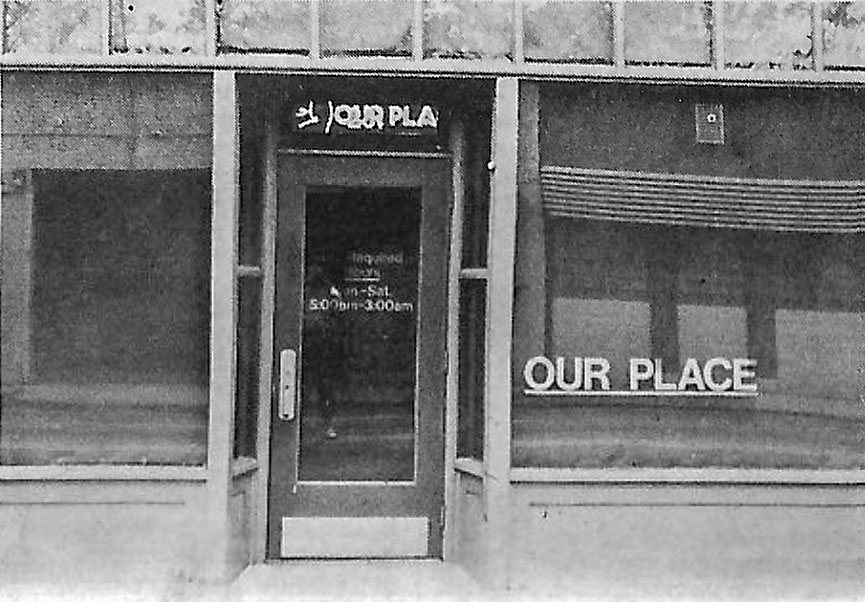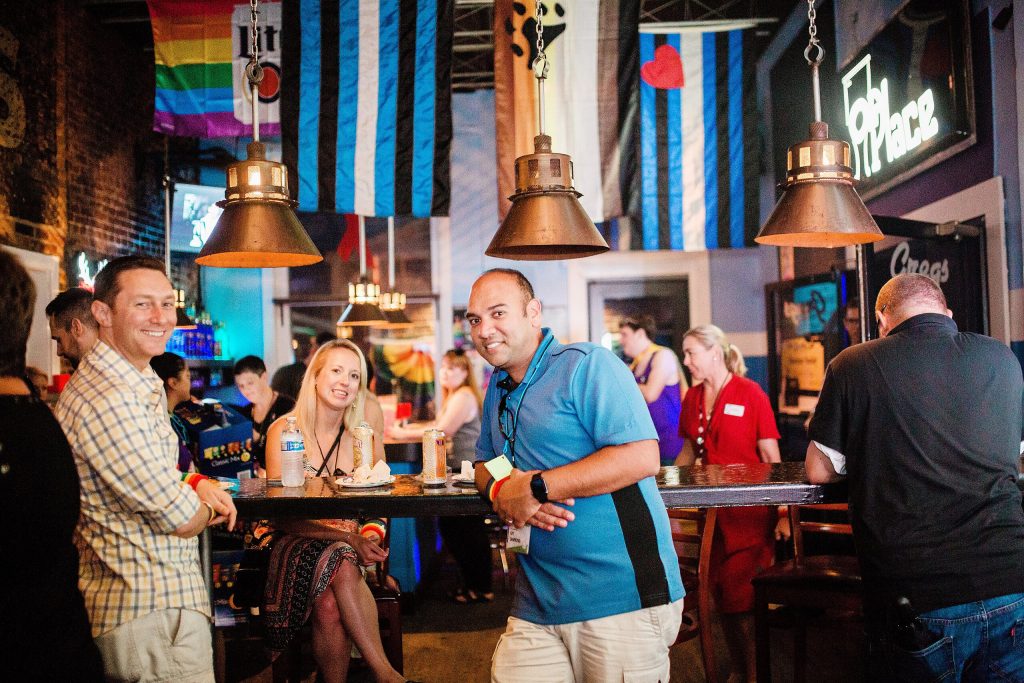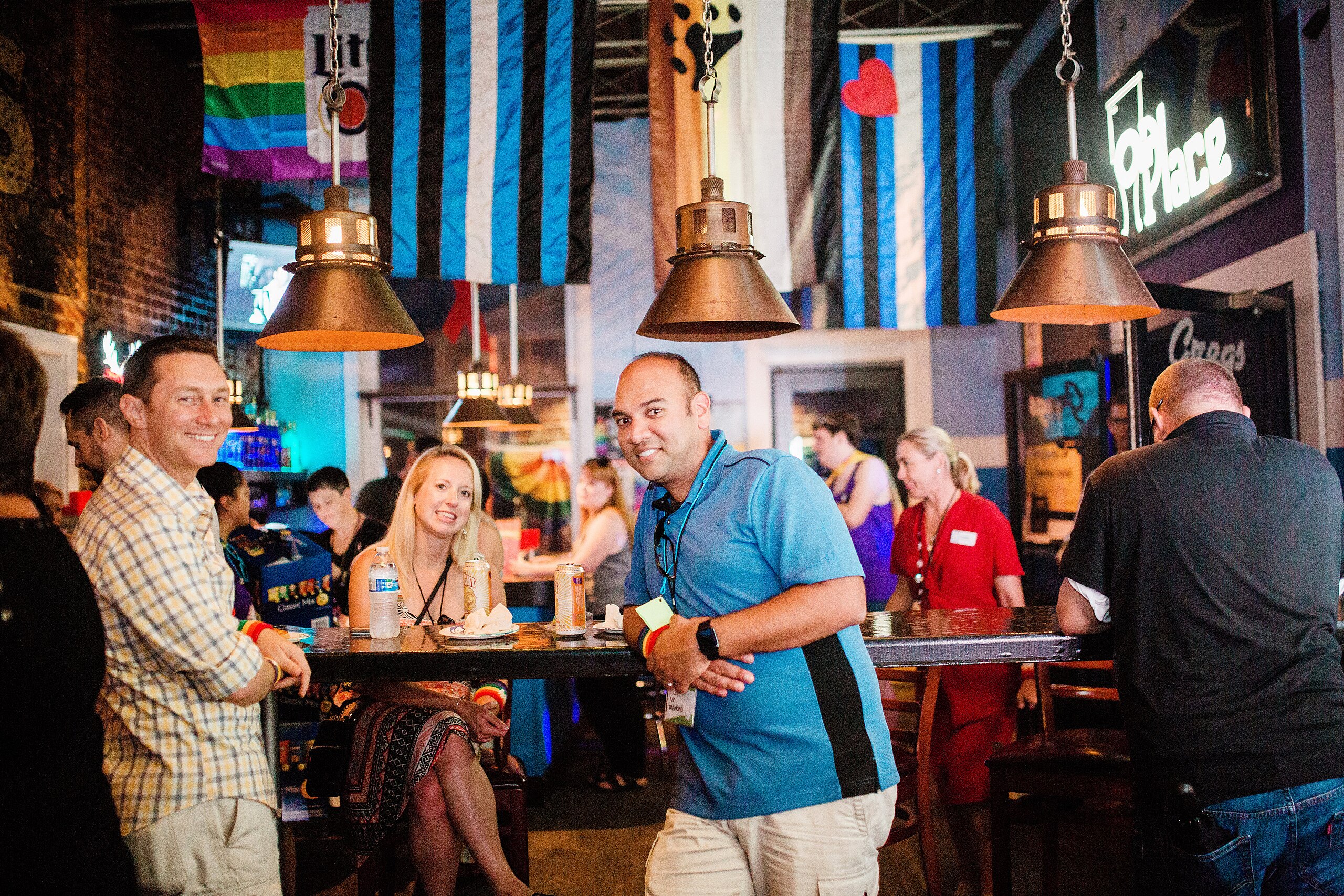Greg’s Our Place, an LGBTQ+ bar and nightclub at 231 E. 16th Street in Indianapolis’s neighborhood, started as a one-room bar called the Wawasee Tavern. Bill Brown and Dean Gardner purchased the bar in June 1980, made improvements to the venue, and reopened it as the LGBTQ+ club Our Place on July 1, 1980. Since then, the venue has changed ownership numerous times but has remained a staple for LGBTQ+ nightclubbers.

Within a few years of opening Our Place, Brown and Gardner expanded the bar by adding another room. By 1990, they had added a dance floor, game room, and curved bar. The venue was advertised as “a predominantly male ‘leather’ bar,” making it Indianapolis’s first venue of that type. The leather subculture in the LGBTQ+ community originated from the biker culture that emphasized masculinity, community, and sexual expression.
As the bar’s popularity increased, Brown and Gardner seized the opportunity to promote causes important to the LGBTQ+ community. They supported the Greater Indianapolis Gay Business Association (GIGBA) and the . The latter organization debuted a new drag performer, at Our Place to raise awareness about AIDs.
Despite success in the 1980s and 1990s, some patrons became targets of crime and harassment, which police blamed on area residents. Muggings, vandalism, and assaults necessitated the hiring of off-duty police as security guards on weekends; however, most incidents occurred off the bar’s property as bar patrons left for the night.
The anxiety of Our Place’s patrons was heightened by a string of unsolved murders of gay men in Indianapolis and along the Interstate 70 corridor from Indianapolis to Columbus, Ohio (see ). Several murder victims frequented Our Place, and one victim’s car was found in Our Place’s parking lot. Though police patrolled the area and occasionally worked undercover at Our Place, the venue gained a reputation as dangerous to visit throughout the 1980s and 1990s.
Another challenge emerged in 1989, when the owners of Our Place faced allegations of discrimination against trans patrons and customers in drag. Reports in indicated that Our Place and other local gay bars, including the and Jimmy’s, refused service to these customers. The (IXE) threatened legal action against the venues. Our Place responded that it had faced a recent influx of “drag queens” from recently closed bars catering to that clientele, allegedly undermining Our Place’s identity as a venue primarily for male-presenting customers. In response, Our Place enforced a new dress code and ID rules that denied entry (except for special events) to customers whose appearance did not match their official ID photos, a measure it claimed would “to preserve the established masculine atmosphere” of the establishment. Despite IXE’s complaints, the situation remained unresolved, even after The Works published a story about Our Place’s undercover police arresting a trans person in the bar’s parking lot for attempting to enter the club in July 1989.
More than two years later, in September 1991, reported about homophobia and racism faced by Indianapolis’s Black gay community at area clubs. The article pointed to Our Place as a white-majority bar where Black patrons felt unwelcome. Despite compounding claims of discrimination, Our Place continued to draw patronage and support from a primarily white clientele with interest in the leather subculture.
After the 1992 death of Dean Gardener, Bill Brown sold Our Place to Phil Denton and Greg Powers. The new owners expanded the bar by adding a pool-table room and installing a state-of-the-art sound and lighting system. Under their ownership, Our Place prioritized support for the LGBTQ+ community. The bar hosted an annual Indianapolis AIDS Walk, weekly STI (sexually transmitted infection) screenings with The Bell Flower Clinic, and AIDS awareness events with the Indy Bag Ladies, the , and Step-Up, Inc.

In 2002, Denton renamed the bar Greg’s Our Place in honor of his co-owner and partner, Greg Powers, who had died recently. Later that year, Denton also collaborated with to rename the Direct Emergency Financial Assistance (DEFA) Program after Powers. The DEFA program had been established in the late 1990s to aid Hoosiers living with HIV and AIDS. After Denton’s death in 2017, ownership of the bar passed to his partner, Mark Condon, who died a year later. New owners Derek Theriac and Greg Cotton purchased the bar in 2018 and continued its legacy of involvement in LGBTQ+ cultural and political activism.
Greg’s Our Place continues to play a key role in Indianapolis’s LGBTQ+ community. The bar, commonly called “Greg’s,” features drag performances and hosts regular fundraisers, concerts, and leather nights, the latter in homage to being Indianapolis’s first leather bar.
FURTHER READING
- Gregs Our Place. https://www.gregsourplace.com/about.
CITE THIS ENTRY
APA:
Schabel, G. (2025). Greg’s Our Place. Encyclopedia of Indianapolis. Retrieved Mar 3, 2026, from https://indyencyclopedia.org/gregs-our-place/.
MLA:
Schabel, Gipson. “Greg’s Our Place.” Encyclopedia of Indianapolis, 2025, https://indyencyclopedia.org/gregs-our-place/. Accessed 3 Mar 2026.
Chicago:
Schabel, Gipson. “Greg’s Our Place.” Encyclopedia of Indianapolis, 2025. Accessed Mar 3, 2026. https://indyencyclopedia.org/gregs-our-place/.

Help improve this entry
Contribute information, offer corrections, suggest images.
You can also recommend new entries related to this topic.
